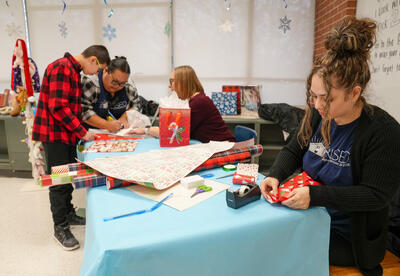Occupational Therapy

Occupational Therapy services provide specialized interventions that support students’ independence and participation in their educational program. School-based occupational therapy services are provided to develop and increase fine motor, daily living, and sensory skills that enable students to participate in meaningful and purposeful educational activities. Occupational Therapists collaborate with the family and educational team to identify the needs, supports, modifications and accommodations that are required for the student with diverse needs to access their education with improved outcomes.
Diagnostic & Educational Service Center (DESC)
District Services Coordinator
PL Coach: Instructional/Autism
Professional Learning Administrative Assistant
The Focus of the NSSEO Occupational Therapy Program is to assess specific sensory, perceptual and motor abilities and determine the specialized interventions and strategies that will most effectively minimize barriers and facilitate students’ learning and participation in their educational program. Occupational Therapists collaborate with families and educational teams regarding students who demonstrate physical, sensory, neurological, or motor disabilities which interfere with access to their education.
The Occupational Therapy team consists of highly qualified, licensed Occupational Therapists with experience working with school-aged children. Occupational Therapists continue to expand and apply knowledge in the field by attending and presenting at local and state conferences on school-based occupational therapy.
- Direct services
- Coaching, consultation, and problem solving with educational teams
- Modification and/or accommodation of materials
- A service delivery model and roles reflective of a school-based team approach to multi-tiered supports for academic and behavioral success – Response to Intervention (RtI) and positive behavior interventions and supports (PBIS).
- Maximizing student’s functional movement and postural control
- Promoting sensory regulation
- Developing fine and visual motor skills
- Teaching organizational and self-care skills within the school
- Using assistive technology to access the educational program
- Training staff to ensure carryover of skills and maximize student progress
- Assessment of fine and sensory motor needs



